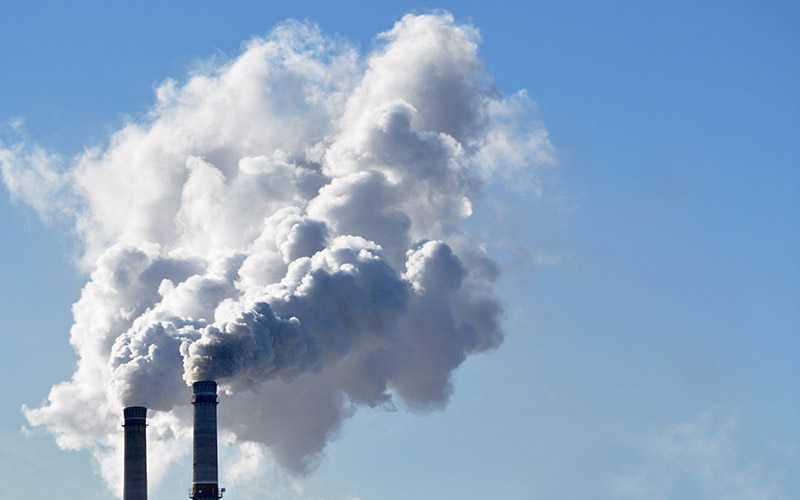Operating permits like those issued under the Environmental Protection Agency’s (EPA) Clean Air Act ensure manufacturing and chemical processing facilities are monitoring and controlling the emission of pollutants. Compliance is both a matter of public health and environmental protection, and failure to obtain proper air permits can result in fines or legal action.
Environmental air quality and permitting are some of the most convoluted regulations in the industry. Requirements are nuanced and vary widely from state to state, so much that even environmental engineers find themselves regularly conducting in-depth research to ensure permitting adheres to all necessary requirements.
What are the air permitting requirements for industrial manufacturing and chemical processing?
Like any regulatory requirement, the answer is: “It depends.” The Clean Air Act alone has numerous air quality permit requirements that cover the whole United States. Generally, most states have been delegated authority to oversee and implement these air quality regulations. The applicability of each program depends on factors including your location, facility type and size, and operations or processes involved. In certain areas of the country, implementation of these regulations may even be the responsibility of county or local government agencies.
State environmental air quality and permitting requirements are often modeled after or mirror federal rules with sometimes additional requirements built on top of federal rules. State rules can be stricter than the Federal rules and have different implementation guidelines. These factors can make an already complicated set of requirements even more difficult to interpret.
Even experienced environmental engineers put significant effort into reviewing federal and state registers to determine which requirements apply to a particular scenario. Failure to perform due diligence can delay your project, which is why we always recommend having a consultant help you navigate the permitting process.
When should I start thinking about air quality permits?
Air permitting should be addressed earlier than you think. There is a common misconception that you acquire permits when a new facility is near completion or as part of operational preparations post-construction. That can be a dangerous and costly mistake. In reality, you need to finalize all paperwork early in the facility planning process—well before you break ground. Typically, air permits are required prior to starting construction on permanent fixtures such as footings and buildings where the equipment will be housed.
It is also important to understand that the permitting process may take a long time to complete. After your environmental consultant helps you determine which permits apply to your situation, work with them to build a realistic timeline for creating necessary documents and submitting application paperwork to the required agencies. The size of the permit often determines how long the process will take, and whether there is any flexibility in the guidelines that must be met for the permit. Proactive communication with your consultant will ensure your schedules are aligned and save you the pain and trouble of redoing paperwork or missing critical submission deadlines.
Another common mistake facility operators make is failing to document which, if any, factors exclude you from a specific state or federal air quality permit requirements. Over time, these exclusionary factors can collectively become applicable requirements under the Clean Air Act or state and local regulations. For these reasons, it is also important to conduct regular reporting and permitting audits with your consultant.
When is a permit modification required?
Federal and state agencies do not always provide direct updates on regulatory changes applicable to your existing air quality permitting. It is up to the facilities being regulated to know which rules apply to them. A general rule of thumb is that any facility or operational change can trigger the need to modify your existing permit. For example, debottlenecking, adding a tank or spray gun, or using a different process chemical could affect emissions and, therefore, require you to obtain a permit modification. Again, you must be proactive and evaluate how any planned changes affect regulatory compliance, and then apply for and obtain a modified air permit prior to implementing those changes.
Communicate with your environmental engineering consultant regularly and in advance of any facility changes before and after construction, even if you think it’s insignificant. An Air Permit Applicability Determination report can be used to document the permitting you do need, along with new exclusionary factors that could eventually lead to requiring a new state or federal permit.
Support in Navigating Complex Permitting Processes
The information above is a very high-level overview of an extremely complex process. Environmental Protection Agency air quality permitting and state regulatory guidelines change frequently, requiring proactive and detailed monitoring of procedures, definitions, and compliance requirements established by local, state, and federal agencies.
Pinnacle Engineering’s team is skilled in preparing comprehensive environmental reports and managing all permitting and reporting requirements under federal, state, and local laws. When you work with us, you can be assured that your projects will receive the attention and effort needed to keep your project on track. Request a consultation to get started.

